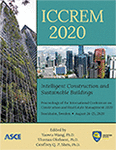International Conference on Construction and Real Estate Management 2020
Optimizing Allocation for Emergency Resources in Natural Disasters
Publication: ICCREM 2020: Intelligent Construction and Sustainable Buildings
ABSTRACT
In recent years, with the increase of population density and the expansion of human economic activities, natural resources have been unscrupulously seized, which leads to great damage to the environment which human beings depend on. Therefore, the occurrence period of sudden disaster events is constantly shortened while the scope of influence is constantly expanded. These natural disasters show the character of high outbreak frequency and great social harm. Besides, these disastrous events not only bring huge economic loss to individuals but also cause great harm to people’s psychology. Nowadays, people pay more attention to the natural disaster events because of the serious harm and far-reaching influence of the sudden disasters. How to early-warning, deal with, control, and reduce the disaster loss as much as possible have become an important issue for all countries around the world. Scientific distribution of limited emergency resources and delivering them in time play an important role in guaranteeing the life safety of victims and improving the effect of rescue. On this basis, we study how to allocate the resources to minimize the disaster loss and how to forecast the saving to achieve the lowest economic cost.
Get full access to this article
View all available purchase options and get full access to this chapter.
ACKNOWLEDGEMENTS
This paper was supported by the National Key Research and Development Program of China (No.2016YFC0701904).
REFERENCES
Beraldi, P. and Bruni, M.E. (2009). “A probabilistic model applied to emergency service vehicle location.” European Journal of Operational Research, 196(1), 323-331.
Banomyong, R. and Sopadang, A. (2010). “Using Monto Carlo simulation to refine emergency logistics response models: a case study.” Internation Journal of Physical Distribution Logistics Management. (2010), 0960-0035.
Chung, L.K., Yang, L.S. and Chen, Y.C. (2010). “The study of Stackelberg equilibrium for post-disaster stockpiles distribution problem.” Journal of the Eastern Asia Society for Transportation Studies, 25(8), 55-62.
Fiedrich, F., Gehbauer, F. and Rickers, U. (2000). “Optimized resource allocation for emergency response after earthquake disasters.” Safety Science, 35(1), 41-57.
Ge, H.L. and Liu, N. (2014). “Stochastic programming model of emergency resource allocation in complex disaster situation.” Systems Engineering-Theory Practice, 34(12), 3034-3042.
Hu, Z.H. and Lin, Q.F. (2015). “Study on evacuation of disaster victims and distribution of relief material considering psychological cost.” Application Research of Computers, 32 (5), 1339-1344. (in Chinese).
José, H., Noel, P., Miguel, J., Luk, N. and Felipe, A. (2013). “On the appropriate objective function for post-disaster humanitarian logistics models.” Journal of Operations Management, 31(3), 262-280.
Lin, Q., Zhao, Q.H. and Ni, D.M. (2018). “A model of emergency resource’s reserve considering the relationship between correlation and substitution.” Journal of Management Science and Engineering, 21(8), 112-126. (in Chinese).
Qu, H.M., Li, H.L. and Xu, H.G. (2015). “Reserve model of emergency resource based on grey prediction theory.” South China Journal of Seismology, 35(2), 24-27. (in Chinese).
Sheu, J.B. (2010). “Dynamic relief-demand management for emergency logistics operations under large-scale disasters.” Transportation Research Part E: Logistics and Transportation Review, 46(1), 1-17.
Information & Authors
Information
Published In
ICCREM 2020: Intelligent Construction and Sustainable Buildings
Pages: 184 - 189
Editors: Yaowu Wang, Ph.D., Harbin Institute of Technology, Thomas Olofsson, Ph.D., Luleå University of Technology, and Geoffrey Q. P. Shen, Ph.D., Hong Kong Polytechnic University
ISBN (Online): 978-0-7844-8323-7
Copyright
© 2020 American Society of Civil Engineers.
History
Published online: Oct 14, 2020
Published in print: Oct 14, 2020
Authors
Metrics & Citations
Metrics
Citations
Download citation
If you have the appropriate software installed, you can download article citation data to the citation manager of your choice. Simply select your manager software from the list below and click Download.
